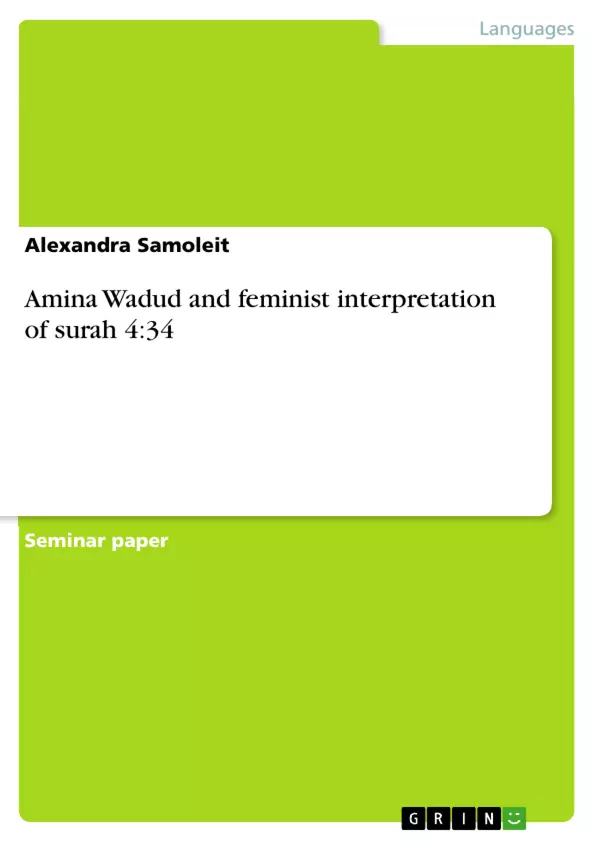The paper introduces the North-American Muslim scholar and feminist Amina Wadud. Her work is focused on finding ways to produce a gender-conscious tafsir of the Qur’an based on hermeneutic methodology. She wants to show how the egalitarian quranic principles concerning women have been distorted through the history of exegesis. Those principles have to be re-examined to achieve an understanding of the revelation that is appropriate for modern times.
Her perspective is related to general Islamic feminist discourse and its opinion concerning quranic exegesis. The methodological approach used by Wadud concentrates on four points: the reader as subject, the Arabic language as barrier to interpretation, historical contextualization and gender as interpretive category.
Her own exegesis arrives at a egalitarian interpretation of the Qur'an that contradicts tafsir tradition and caused heated discussions in the global Muslim community in recent years.
Inhaltsverzeichnis (Table of Contents)
- Introduction
- Amina Wadud's work in context of Muslim feminism and Qur'an exegesis
- Who is Amina Wadud?
- Feminism and the Qur'an
- Hermeneutics and methodology in Amina Wadud's Work
- Amina Waduds exegesis
- General conclusions about women and the Qur'an
- The traditional interpretation of surah 4:34
- Amina Wadud's interpretation of surah 4:34
- Resume
Zielsetzung und Themenschwerpunkte (Objectives and Key Themes)
This paper aims to introduce Amina Wadud, a North-American Muslim scholar and feminist, and her work in finding ways to produce a gender-conscious tafsir of the Qur'an. The paper will focus on her hermeneutic methodology, her critique of patriarchal interpretations of the Qur'an, and her arguments for a more egalitarian understanding of the text.
- Amina Wadud's feminist interpretation of the Qur'an
- The impact of patriarchal interpretations on understanding the Qur'an
- The importance of historical context in interpreting the Qur'an
- The role of gender as an interpretive category
- The relevance of Amina Wadud's work for contemporary Muslim discourse
Zusammenfassung der Kapitel (Chapter Summaries)
- Introduction: This chapter introduces Amina Wadud and her controversial 2005 sermon, highlighting the conservative reaction within the Muslim community. It discusses the fear of change and the need for a more inclusive understanding of Islam.
- Amina Wadud's work in context of Muslim feminism and Qur'an exegesis: This chapter provides a brief overview of Amina Wadud's background and her work. It explores her feminist perspective on the Qur'an, highlighting her belief in the equality of men and women. This chapter also delves into the wider context of Muslim feminism and its focus on the Qur'an as a primary source for understanding gender equality.
- Amina Waduds exegesis: This chapter examines Amina Wadud's approach to interpreting the Qur'an and her key findings regarding gender equality. It explores the traditional interpretations of surah 4:34 and contrasts them with Amina Wadud's own feminist interpretation.
Schlüsselwörter (Keywords)
Key terms and concepts discussed in the paper include feminist interpretation, Qur'an exegesis, gender equality, tafsir, hermeneutics, historical contextualization, surah 4:34, Amina Wadud, Muslim feminism, patriarchal interpretations.
- Citar trabajo
- Alexandra Samoleit (Autor), 2007, Amina Wadud and feminist interpretation of surah 4:34, Múnich, GRIN Verlag, https://www.grin.com/document/84172



